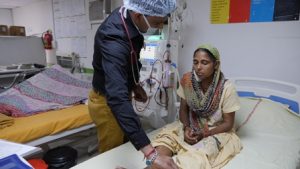For achieving universal care for kidney diseases
A renewed focus on early intervention, innovating later-stage care and improving the evidence base for policy makers are the way forward, suggests a paper published in an international journal of the International Society of Nephrology.
 Expanding on the official World Kidney Day 2019 theme of universal coverage of kidney diseases to mark the World Kidney Day today, a renewed focus on early intervention, innovating later-stage care and improving the evidence base for policy makers are the way forward, suggest a paper published in the Kidney International Reports, the official journal of the International Society of Nephrology (ISN).
Expanding on the official World Kidney Day 2019 theme of universal coverage of kidney diseases to mark the World Kidney Day today, a renewed focus on early intervention, innovating later-stage care and improving the evidence base for policy makers are the way forward, suggest a paper published in the Kidney International Reports, the official journal of the International Society of Nephrology (ISN).
The senior author on the paper, Prof. Vivekanand Jha has argued that universal health coverage articulated in the UN Sustainable Development Goals, represents an opportunity for substantial gains to patients living with or at risk of kidney diseases.
“There is an urgent need to focus on early intervention. Promoting a healthy lifestyle, good nutrition, clean water and environments, and infection and tobacco control are critical for preventing kidney complications along with population-based approaches to prevent the key known risks for kidney disease like blood pressure control and effective management of obesity and diabetes,” said Prof. Jha, who is also Executive Director of The George Institute for Global Health, India and President elect of ISN.
Also read: Kidney disease is already an epidemic: Dr Rohini Prashar
“The World Health Organization estimates that kidney diseases are responsible for almost 1.5 per cent of the current global burden of disease and for 2.1 per cent of the total deaths, making it the twelfth leading cause of death globally.”
Entitled ‘Universal Care for Kidney Diseases: Sustainable Development or Path to Financial Ruin’, the paper identifies priority areas for kidney disease research, policy-making, and actions by the clinical community.
 “There is a need to innovate later stage care which includes developing low-cost dialysis technology, removing barriers to the transplantation process and improving utilisation of kidneys from deceased donors,” argued Prof. Jha. “Examining and expanding initiatives such as task-shifting, better access to home-based peritoneal dialysis and supportive care where clinically appropriate to reduce costs are priority actions that needs to be initiated,” he added.
“There is a need to innovate later stage care which includes developing low-cost dialysis technology, removing barriers to the transplantation process and improving utilisation of kidneys from deceased donors,” argued Prof. Jha. “Examining and expanding initiatives such as task-shifting, better access to home-based peritoneal dialysis and supportive care where clinically appropriate to reduce costs are priority actions that needs to be initiated,” he added.
The ill health resulting from kidney diseases is compounded by the economic burden on households and health systems with a whopping 188 million people experiencing catastrophic health expenditure annually in low and middle income countries. Furthermore, dialysis and kidney transplant remain unaffordable in many of these countries.
Also read: The Art of Mental Health
The paper’s co-author Prof Blake Angell, who heads the Health Economics and Process Evaluation program, at the George Institute for Global Health, Sydney, said methods to bring down the cost of current treatments and search for alternatives need to be a key focus for the research and clinical communities. “Efforts toward affordable dialysis processes offer the promise of widespread access to cost-effective care,” said Dr. Angell.
The George Institute for Global Health is working on developing an affordable dialysis machine that bring down the cost of dialysis. And through the SMARTKidney project, the institute is working to empower female health workers in the community to detect kidney disease early and refer the high-risk cases to the primary health centres.
Appropriate preventive measures including provision of clean drinking water, sanitation and good nutrition is part of its Stop CKDu (Chronic Kidney Disease of Unknown Origin) intervention in the Srikakulam district of Andhra Pradesh.
“We hope that the data and evidence we generate from these projects will help us inform clinicians and policy makers to use the push for Universal Health Care as a catalyst for reforming the care of kidney diseases around the world,” said Prof. Jha.
He added, “Better identification of kidney disease burden, setting up of kidney disease registries, documenting unintended consequences as interventions and models of care are scaled up across systems and evidence showing the impact of different financing mechanisms are measures that can improve the evidence base facing policy makers.”
